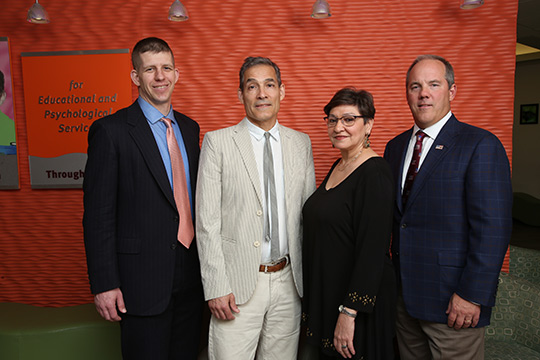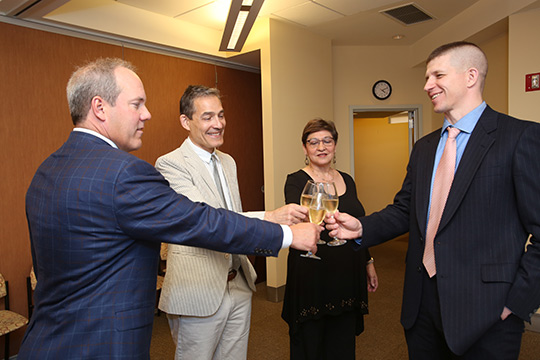TC Establishes Resilience Center for Veterans and Families
$1 Million Gift from David and Maureen O’Connor to unite research and treatment for service members as they transition to civilian life.
New donors David and Maureen O’Connor have given $1 million to Teachers College, Columbia University to fund the creation of a new Teachers College Resilience Center for Veterans & Families.
The Center will bring together one of the world’s foremost authorities on human emotional resilience, a TC clinic that serves low-income and minority families, and which will now actively recruit the most qualified students to provide counseling to veterans, their spouses or partners, and their children; and a TC doctoral student whose own combat experience has led him to study a potentially groundbreaking new approach to helping veterans transition back to civilian life.
“There’s not a day my wife and I don’t thank our lucky stars for the dedicated young men and women in the military who essentially write all of us a blank check by risking their lives to serve and defend our country,” said David O’Connor, President of High Rise Partners LLC and a member of the Investment Committee of the Teachers College Board of Trustees. “We support the troops in many ways, but we were looking to do something more strategic that would have a multiplier effect. Teachers College has all the right expertise in health, education and psychology to significantly improve the lives of returning veterans.”
More specifically, the new Center will become the focal point for several related strands of work at the College, including:
- Research by the Loss, Trauma & Emotion Lab directed by George Bonanno, Professor of Psychology & Education. The gift by the O’Connors will fund ongoing research by Bonanno, who has overturned conventional understanding of human emotional resilience. “The old model was that you either have post-traumatic stress syndrome or you don’t, but we map people over time,” says Bonanno. “There are lots of veterans who return in good psychological health, and many more who struggle. Some of those get better, and some don’t. We want to focus on that fork in the road.”
A key part of that research is being conducted by current doctoral student Joseph Geraci, a U.S. Army Lieutenant Colonel and graduate of the U.S. Military Academy at West Point who has served three tours of duty in Afghanistan. Geraci is studying a unique program called Pro Vetus (formerly associated with the organization Battle Buds), which pairs returning veterans with mentors from the business and non-profit worlds.
“I know from personal experience that serving in combat and losing friends or soldiers under one’s command can have a devastating impact,” Geraci says. “I sought help from the Veterans Administration when I returned from Afghanistan, and discovered the power of counseling. We think we have a program that can do even more to promote positive life outcomes and prevent negative ones—most importantly, suicide.”
The gift will also fund additional doctoral students in the lab, including former Army captain, Afghanistan veteran and West Point graduate Meaghan Mobbs, who is currently a second-year forensic psychology student at George Washington University.
- Training and treatment at TC’s Dean Hope Center for Educational and Psychological Services, which provides affordable care for local individuals and families. The O’Connor gift is funding a new Veteran/Family Psychological Services Program at Dean Hope, where Geraci has been training counseling students for the past several months to provide supervised care to veterans and their families, and which will now identify and recruit the most qualified counseling students to provide such counseling in the future. The gift also funds a training supervisor position.
“We’re very excited about this generous gift, because the population we serve is very strongly represented in the military,” says Dinelia Rosa, Director of the Dean Hope Center and past-president of the New York State Psychological Association. “Now we’ll have the expertise we need to do aggressive outreach around veterans’ issues.”
The Dean Hope Center, a training setting for students from the College’s Department of Counseling & Clinical Psychology, which recently received a Graduate Psychology Education training grant from the federal Health Resources and Services Administration to prepare those in the mental health field to work more closely with medical caregivers. The department has also launched Bilingual Latina/o Mental Health Counseling certificate program.
In addition, as the Center evolves it will likely function as a hub for work by other TC faculty members that focus on veterans’ health and well-being.
Teachers College is already involved with the U.S. military on a number of levels. Since 2005, TC and West Point have jointly operated the Eisenhower Leaders Development Program(ELDP), in which West Point officers, mostly captains and majors who have been commanders in Iraq and Afghanistan, absorb a 45-credit curriculum to earn master’s degrees in social-organizational psychology and stay on at West Point for another two or three years to serve as company tactical officers, or TACs—leaders who help cadets (West Point undergraduates) meet and balance the various requirements of a West Point education.More recently, W. Warner Burke, TC’s E.L. Thorndike Professor of Psychology & Education, was named to a Blue Ribbon advisory panel of health care and innovation leaders that will review analyses and assessments performed as part of the Veterans Access, Choice and Accountability Act of 2014.
O’Connor said these programs also influenced his decision to fund work at Teachers College.
“We see our gift as seed capital to get this Center going,” he says. “We think there’s significant potential to attract funding from other sources, including the government.”
(Published 5/20/2015)
The views expressed herein are those of the author and do not necessarily reflect the position of the U.S. Military Academy, the Department of the Army, or the Department of Defense.
Published Wednesday, May. 20, 2015

